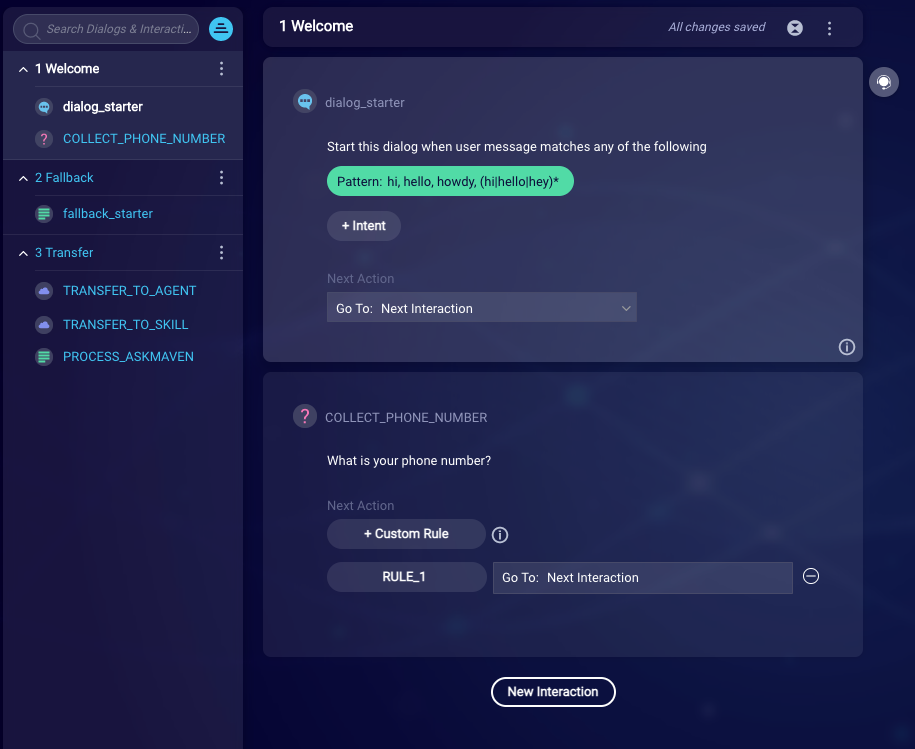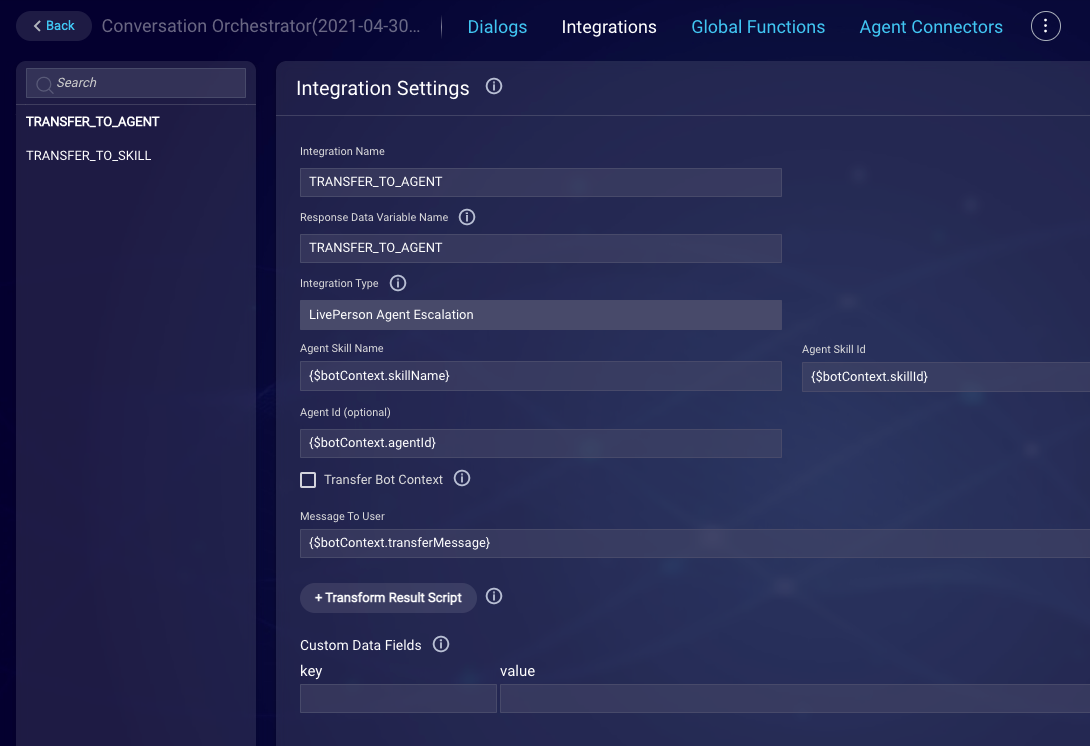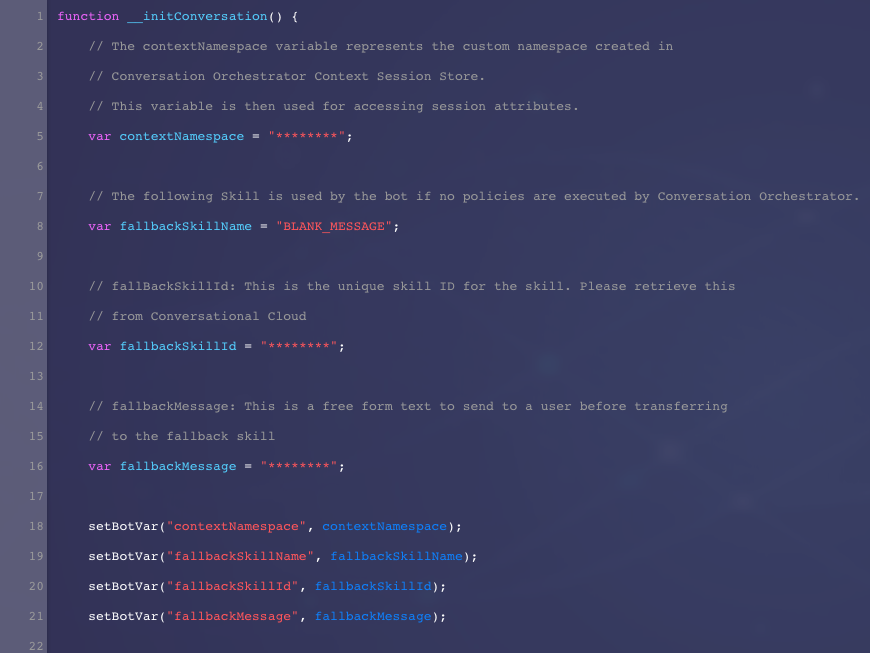The Conversation Orchestrator bot template in LivePerson Conversation Builder comes pre-wired with integration to Conversation Orchestrator's Dynamic Routing and Conversation Context Service, enabling you to set up and build personalized consumer journeys easily.
The following example flow can happen with this template:
- The conversation starts with a Welcome intent, for example “hi.”
- The bot then asks the customer for a phone number.
- The phone number is stored in Conversation Orchestrator's Conversation Context Service.
- Conversation Orchestrator evaluates policies based on the phone number (whether phone number is in a VIP list or a Regular Customer List).
- Bot transfers the conversation to a skill or agent based on the policy outcome.
This bot template contains global functions brought over from the Global Helper Functions bot template.
Included items
Dialogs
- 1 Welcome: The Welcome dialog greets the user and collects their phone number for use in dynamic routing policies.
- 2 Fallback: This is displayed when the user enters an utterance that is not recognized.
- 3 Transfer: Contains integration tiles to transfer to a different skill or agent based on the result of dynamic routing policies.

Integrations
- TRANSFER_TO_AGENT: Performs a transfer to a Conversational Cloud agent and skill. Agent ID, Skill Name, and Skill ID will be provided by a call to the Next Actions API based on dynamic routing policies.
- TRANSFER_TO_SKILL: Performs a transfer to a Conversational Cloud skill. Skill Name and Skill ID will be provided by a call to the Next Actions API based on dynamic routing policies.

Configuration needed
The important environment related variables are stored in the Global Functions, and for most cases this is the only area you will edit.

Open the bot. On the top navigation click Global Functions and edit the following fields:
-
contextNamespace: Please enter the namespace you have defined in your Conversation Context Service for storing and retrieving session variables. -
fallbackSkillName: Please enter the skill name for the fall back skill. This skill is used by the bot if no policies are executed by Conversation Orchestrator. -
fallbackSkillId: Please enter the skill ID for the fall back skill. This skill is used by the bot if no policies are executed by Conversation Orchestrator. -
fallbackMessage: Please enter a message to send to customer when the fallback route.
Click Save.
Configure Conversational Cloud and deploy the bot.
Pre/post-process code
The COLLECT_PHONE_NUMBER interaction contains the following Process User Response code to use botContext methods to store the phone number in the Conversation Context Service.
// Retrieve namespace bot variable and register context namespace
var contextNamespace = getBotVar("contextNamespace");
var success = botContext.registerContextNamespace(contextNamespace);
debugMsg("Conversation Orchestrator registerContextNamespace:: " + success);
// Pull in the phoneNumber variable captured in the conditions and set to the Conversation scoping in the Conversation Context Service
var phoneNumber = getBotVar("phoneNumber");
setContextConv("phoneNumber", phoneNumber);
// Custom Event Logging for setting Context Session Store
logEventAdv(getUserMessage(), "Conversation Orchestrator Session Store","Maven Session Store was called for namespace labelled '"+ getBotVar("contextNamespace") + "' for account '" + getBotVar("accountId") + "' ("+ getBotVar('conversationId') + ")");
The PROCESS_ASKMAVEN interaction contains the following Pre-Process Code which uses botContext methods to call the Next Actions API and retrieve the matched routing policy. This policy is then used in the setTransferParameters function to prepare the escalation integration.
// Call Conversation Orchestrator Next Actions API
var orchestratorRecommendations = botContext.askMaven();
var data = JSON.parse(orchestratorRecommendations);
debugMsg("Maven Recommendations:: " + orchestratorRecommendations);
// Custom Event Log for askMaven response
logEventAdv(getUserMessage(), "Ask Maven","Ask Maven was called for namespace '"+ getBotVar("contextNamespace") + "' for account '" + getBotVar("accountId") + "' ("+ getBotVar('conversationId') + ")");
// Set transfer param variables
var agentId = null;
var skillId = null;
var skillName = null;
var transferType = null;
// If a policy is matched, process the policy. If not, transfer via fallback
if (data.rule) {
var actions = data.rule.actions;
for (var action in actions) {
var type = actions[action].type;
switch (type) {
case "SEND_MESSAGE":
sendMsg(actions[action].payload.message);
break;
case "TRANSFER_TO_AGENT":
agentId = getBotVar('accountId')+'.'+ actions[action].payload.userId;
skillId = actions[action].payload.skillId || "-1";
transferType = "TRANSFER_TO_AGENT";
setTransferParameters(agentId, skillId, skillName, transferType);
break;
case "TRANSFER_TO_SKILL":
skillId = actions[action].payload.skillId;
transferType = "TRANSFER_TO_SKILL";
setTransferParameters(agentId, skillId, skillName, transferType);
break;
}
}
} else {
sendMsg('No policy matched, routing to fallback skill');
setTransferParameters(agentId, skillId, skillName, transferType);
}
The PROCESS_ASKMAVEN interaction contains the following Post-Process Code which takes the transferType variable and routes to the appropriate agent or skill escalation interaction.
// setTriggerNextMessage to appropriate transfer type
var transferType = getBotVar("transferType");
if (transferType) {
switch (transferType) {
case "TRANSFER_TO_AGENT":
goNext("TRANSFER_TO_AGENT");
break;
case "TRANSFER_TO_SKILL":
goNext("TRANSFER_TO_SKILL");
break;
default:
debugMsg("Policy had a transfer-type other than skill or agent.");
break;
}
}
Using the Conversation Context Service and Dynamic Routing
This bot template is designed for use within the Getting Started guide of our Conversation Orchestrator Dynamic Routing documentation. For details on configuring Conversation Orchestrator to work with this bot template, please follow along with that guide.
